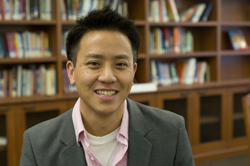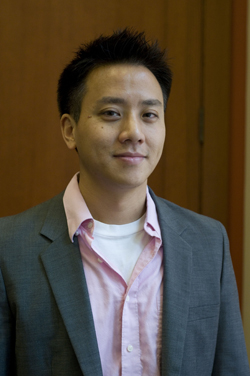Benji Chang: Pedagogy that Liberates
Benji Chang: Pedagogy that Liberates
You’ve come to TC as a post-doctoral fellow in the Institute for Urban and Minority Education. How will you spend your time?
I’m going to teach one course, in the spring. It will focus on Asian-American K-12 school communities, using critical and socio-cultural lenses. I also have some writing projects about these topics covered in my course, as well as my work concerning issues of sustainability and social movements in teaching, participatory action research and community organizing. For my research project, I’m going to work with multiethnic immigrant community spaces, seeing how community groups, teachers and schools can work together to deepen and sustain their efforts towards social justice in public education. Nowadays teachers are asked to do everything, and they can’t cover all that ground. And one of the things that schools of education are not that familiar with is community engagement and organizing, and how that fits in with bringing about educational equity.
Your overall project has to do with what you call “liberatory approaches” to teaching. What does that mean?
I use the term “liberatory” to generally describe approaches to pedagogy that have a critique of power -- that are anti-imperialist, feminist and decolonizing. That’s been a hot topic for some time in educational research, but also more recently in the non-profit world and philanthropy, especially as educators and researchers of color are picking it up and working with students of color. But to me it’s not just about consciousness-raising, political artwork or direct action activism, but also developing solid academic skills within these contexts: it’s sort of fostering reform and revolution at the same time. It’s not about just going to college and getting a degree, but utilizing academic skills like polynomial equations and three-paragraph essays to critically understand how you and your family came to be at the certain place you are in the world, and how you can pursue and sustain a more equitable and just place in your schools and communities.
You’ve had experience with liberatory approaches not just as a researcher, but also as a teacher on the front lines. What issues did you confront?
When I started teaching in 2000 I was in an elementary school in inner-city Los Angeles. I taught first grade, and they’d given me the class that was the “bad class,” the problem class. And I then moved up with this same class every year—a practice that’s called “looping” in K-12 education. By fourth grade, our students were the highest achieving in their grade level. We accomplished that through techniques that were considered radical. You’re supposed to do phonics and test prep, but we were talking about the Black Panthers and doing family trees and service learning. We had high success, and people came from UCLA to document it, and things were great. But as those kids went on to middle school, many of them experienced dramatic reversals. All kinds of things happened to them in other spaces.
That must have been difficult for you to watch as their former teacher.
Definitely. And it went beyond the bumps and bruises that come with adolescence. Some became the top students in their class and community activists, but some were getting locked up or strung out on crack or meth. With the economic downturn and gentrification of the area, most social services were eliminated and their parents were often unemployed. There was alcoholism, gambling and other sorts of abuse -- so I felt this great sense of urgency. And I started asking how we could sustain our earlier achievements over time, beyond just the classroom, school, and student-teacher paradigm.
Along with your doctorate from UCLA and an impressive academic CV, you’re also a longtime b-boy, or hip-hop dancer, and a DJ. How do these different parts of your life connect?
I came of age in the era of “conscious,” politically aware hip-hop; I always felt like there was a social justice project in it as I got more and more involved in the art and business of it. Later, I started feeling hip-hop wasn’t as effective as it could be. I wanted a vocation to continue a social justice project and to bring in elements of hip-hop working with communities. In my dissertation and something I’m hoping to publish while I’m at TC, I look at the performative aspects of this pedagogy and the cultural practices of hip-hop. I don’t label myself as just a hip-hop scholar, but those things in my background are always there.
Published Tuesday, Oct. 11, 2011

